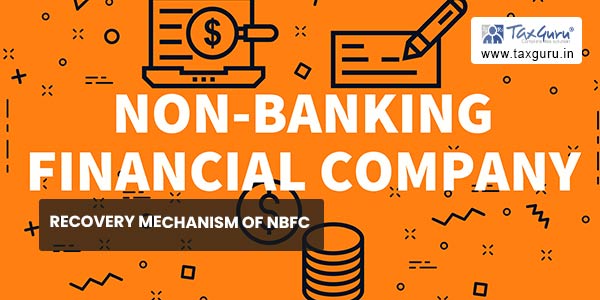Non- Banking Finance Company plays a vital role in the growth of the economy as it provides loan to the entrepreneur to start its venture and provides loan as working capital to run the business effectively. The most challenging phase of the NBFC is for recovery of Loans along with interest.
In line with the issues faced by the NBFC, the Reserve Bank of India (the Bank), having considered it necessary in the public interest has introduced from time to time Master Directions and notifications for working of the NBFCs.
Every Non-Banking Finance Company should lay down Board approved Recovery policy to run their NBFCs effectively. The recovery policy of the NBFC is built around dignity and respect to customers. It is mandatory for the NBFC to follow fair practices with regards to collection of dues and repossession of security and thereby cultivate customer confidence and long‐term relationships.
AIM OF THE RECOVERY POLICY
The aim of the policy is to facilitate recovery of dues in the event of default and not for whimsical deprivation of property to the customer. The policy should recognize fairness and transparency in repossession, valuation and realization of security. All the practices adopted by the NBFC for follow up and recovery of dues and repossession of security will be in consonance with the law.
POINTS TO BE CONSIDERED WHILE FRAMING THE RECOVERY POLICY
 1. Objective: The objective of the recovery Policy should be clear and precise. It should serve the interest of the Customer and should be in consonance with the notifications, Circulars, Master Directions issued by RBI from time to time.
1. Objective: The objective of the recovery Policy should be clear and precise. It should serve the interest of the Customer and should be in consonance with the notifications, Circulars, Master Directions issued by RBI from time to time.
- Recovery Policy should aim at reducing the Company’s NPA level in absolute terms by preventing slippage of accounts, to provide directions to contain slippage to NPA category and accelerating recoveries in the existing NPAs.
- Policy should apprise the Management with their specific roles and responsibilities, manner of dealing with the customer.
- To update system of identification and reporting of accounts showing signs of slippage of ‘NPA’ category.
- To take a pro-active approach in finding solutions which could involve restructuring of loans if intent of borrower is positive.
2. Policy Inclusions:- The Recovery Policy should be in accordance with the Fair Practice Code, which has been approved by the Management .
- Recovery policy should apprise the Recovery Personnel to avoid pestering borrowers during the course of or after the completion of the deal. This would include not communicating directly for loan recovery, not pestering about additional details in attempt to personally verify borrower’s credentials etc.
- In case of any borrower’s default, Recovery team should only deal with approved legal advisors.
- There should be no discrimination on the basis of caste, gender, class and not resort to threatening tone of voice or intrude the privacy of the borrowers or borrower’s family members, while dealing with the customers during the recovery stage.
3. Public Interest: – The Recovery Policy should be in public Interest and in consonance with the notifications, Circulars, Master Directions issued by RBI from time to time.
- The Recovery Policy should have a defined Grievance Redressal Mechanism. It should describe the procedure on how an aggrieved customer can lodge complaint, time period of the resolution of the compliant.
- The procedure for redressing concerns should be simple, timely and cost effective.
- The recovery Team should not unnecessarily harass a Borrower and should be humble in their dealing.
- The terms and conditions for the Recovery should be same for all the borrowers that does not differentiate on factors such as gender, race.
- To ensure that all written and verbal communication with its customers are in simple Language.
4. Manner of Recovery:- The Recovery Policy should define the Manner of recovery exhaustively.
- In case of non-receipt of payment on due date, postdated cheques, if available are presented for recovery of dues. In case of bouncing of cheque, appropriate legal action is initiated under Negotiable Instrument Act.
- In case of habitual late payers, stringent follow-up (telephone call, visit to the borrower’s office, meeting promoters/key officials, etc.) are made for recovery of dues.

- In case of persistent defaults, inherent reasons for default are analyzed and appropriate action is taken urgently before the asset slips into non-performing category.
- The customer should be contacted between 0700 hrs to 1900 hrs in general, unless special circumstance of his / her business or occupation requires contact at a different time.
- Repossession of security should be aimed at recovery of dues and not to deprive the customer of the property
- To serve proper notice before initiating action for taking possession of the security.
- The management can decide the penalty in the form interest for the delay in payments of monthly installments.
5. Terms and conditions:- The recovery Policy should contain the terms and conditions of the Recovery exhaustively.
- The Policy should clearly mention the periodicity of payments, Interest rate charged, additional interest rate on delayed payments.
- The policy should contain the appropriate notice period to take any action against the default borrower.
- On which ground any suit for the recovery should by filed against the borrower and litigation charges if any in respect of that will be borne by the borrower.
- In exceptional cases if there are genuine difficulties being faced by certain borrowers, their accounts may be rescheduled/restructured preferably prior to such loans becoming NPAs as per Board approved restructuring policy.
DISCLAIMER: The entire contents of this article has been prepared on the basis of relevant provisions and as per the information existing at the time of the preparation. Although care has been taken to ensure the accuracy, completeness and reliability of the information provided, the author assumes no responsibility therefore. Users of this information agrees that the information is not a professional advice and is subject to change without notice. The author assumes no responsibility for the consequences of use of this information. IN NO EVENT THE AUTHOR SHALL BE LIABLE FOR ANY DIRECT, INDIRECT, SPECIAL OR INCIDENTAL DAMAGE RESULTING FROM OR ARISING OUT OF OR IN CONNECTION WITH THE USE OF THIS INFORMATION.
THE AUTHOR – CS MONIKA MALHOTRA (PRACTICING COMPANY SECRETARY) CAN BE REACHED AT csmonikamalhotra26@gmail.com or +91-9958089808





